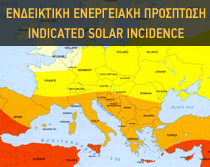
Frequently Asked Questions
-
Why should I install a solar water heater?
Installing one ensures free hot water nearly all year long, immediately, without turning the heater on. Thus, we consume less electricity and we reduce the emissions.
-
When will my solar water heater investment depreciate?
The exact time depends on a number of factors such as the number of the users, the way of using, the area climate etc. Generally, for a four-member family in Greece, the depreciation time is estimated to 5-7 years.
-
Can I install a solar water heater on a tile roof?
All brands that we can provide have special support bases for tile roofs. One of the inclining sides of the roof should have the proper orientation.
-
What is the inverter air-conditioning?
Those air-conditions have a converter of a variable performance and according the desired inner temperature and the space temperature loss, they self-regulate their provided power.
-
What are the advantages of an inverter air-conditioning system?
- Economy. Depending on the machine type and the operating conditions, we have 25-50% less electricity consumption comparing to a normal air-condition of the same power.
- Fast efficiency. An inverter has the ability to achieve the desired temperature at the ¼ of the time of a common unit.
- Steady temperature. Self-regulating their power, inverters can maintain steady temperature with a ±0.2 °C deviation comparing with the ±2 °C of an ordinary unit.
- Inverters are especially powerful in heating and can operate in extremely low (below zero) outside temperatures.
-
Is it worth the extra cost of a good air-conditioning unit?
It sure is. According to official data from Panasonic, an inverter can save 50% electricity comparing to a common unit, which is the difference between a well-known brand of Energy Class A and a cheap Chinese device of obsolete technology. The money that we saved buying such a cheap device will be added perpetually while operating accordingly, for all its life span. Another important factor is the noise levels of the inner unit. 23-26 dB is the noise level of a good unit, while cheaper choices make 34-39 dB. Considering that by 3 dB the sound "duplicates" its power, we can realize that cheap devices are 3-4 times louder. If someone adds the credibility and the after sales service factor, then he realizes that buying a quality unit of current technology is a one-way option.
-
Why should I be connected with the gas network?
- It ensures 20% economy comparing to oil.
- It is environment-friendly.
- Because first we consume and then we pay the exact consumed quantity.
- No refueling or quantity checking is required.
- We gain space from the absence of a gas tank and we avoid the undesired fumes of the oil tank.
-
What are the advantages and disadvantages of the in-floor heating?
- The advantages are the fuel economy, the uniform and steady residence temperature and the complete lack of radiators.
- There are, however, some constrictions at the materials that should be used and the way of applying the floor, the water/sewage pipes and the use of carpets.
In general, in-floor heating has overhang during turning on and off and it is suggested in big residencies in cold climates.
-
Can I install radiators in an already-built house?
Yes, assuming that there would be visible piping at the height of the kick plate. There is the capability to install a wall gas boiler if the residence is in the gas network or to construct a boiler room if the suitable space is provided for a boiler room and a tank.
-
Can I switch the existing oil heating system to gas?
Provided that an active gas pipe exists outside the house, the change is easy. Often only the heater needs changing to a gas one and rarely is a boiler-heater change necessary so that you can have gas heating with the advantages described above (question 7).




